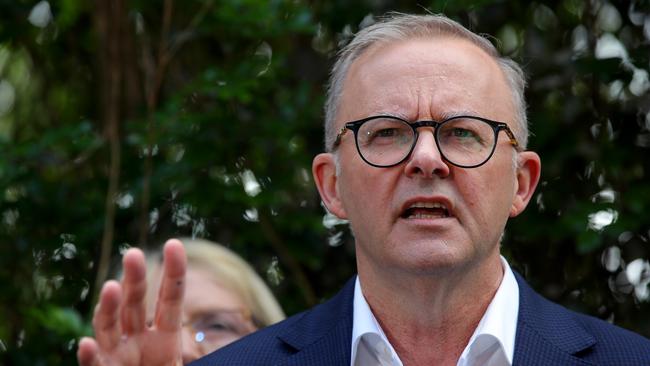
Labor frontbenchers, backbenchers, candidates, staff and campaigners spoken to for this column have expressed deep concern and alarm about the Opposition Leader’s campaign performance. It has been disastrous and some fear it is going to get only worse as they scale back expectations for seats they can win.
There is no panic yet, but there is real worry over Albanese’s campaign preparation and readiness, the capacities of his personal staff and the experience of Labor’s campaign team in Sydney. Some Labor figures say they are not surprised while others have been shocked at the series of blunders.
The anxiety level in Labor was elevated on day zero, the day Scott Morrison announced the election date, when Albanese appeared at an afternoon press conference. He did not have a clear message or theme and rambled his way through an opening statement as if it was not rehearsed, and he did not have sharp responses to questions.
The Coalition’s campaign themes are clear: the election is about who do you trust to manage the economy and keep unemployment low, and safeguard national security, while characterising Albanese as a risk.
Labor has had “on your side”, “build back better” and now “a better future”. Not exactly consistent, coherent or cut-through.
The gaffes began on day one of the campaign: not being able to name the unemployment rate or Reserve Bank cash rate; repeated mistakes over asylum-seeker policy; saying Labor’s urgent care clinics were costed by the Parliamentary Budget Office, then clarifying they were not; promising to answer media questions, then cutting short press conferences. There was the claim Albanese had been an economic policy adviser to the Hawke government. He was an electorate officer to junior minister Tom Uren, who did not hold an economic portfolio. If Albanese did offer economic advice, it was ignored because he was a persistent critic of the economic reforms of the Hawke-Keating government.
The Coalition should be on the mat and down for the count. The past nine years have been marked by a revolving-door Liberal and Nationals party leadership, internal division, policy backflips and broken promises, and a chaotic parliament. The Prime Minister is unpopular. Deputy Prime Minister Barnaby Joyce is a national joke. But, with the economy booming, they just may pull off another miracle election victory.
Albanese’s stumbles have reinforced to many in Labor that his office and the party’s national secretariat have been running the wrong strategy for the past three years. Albanese is still not well known and his small-target policy approach means voters are struggling to find reasons to vote Labor. The opposition does not have a bold, animating, compelling agenda that speaks to its values and presents as a clear and convincing alternative to the government.
Some critics say Albanese’s office, led by former Labor national secretary Tim Gartrell, is to blame. Gartrell has long been out of the game, running Labor’s dreadful 2004 campaign with Mark Latham as leader and the victorious 2007 campaign with Kevin Rudd as leader. The latter was 15 years ago. Some Labor MPs fear 2022 is a repeat of 2004.
While the criticism is that Albanese’s office is staffed by an old mates network and inexperienced young advisers, the internal criticism of Labor’s campaign headquarters is equally savage.
Labor’s national secretary Paul Erickson, a prickly personality, has never run a national campaign. Those who worked on Labor’s 2019 campaign, with vital experience, have almost all moved on. The Coalition’s campaign team, based in Brisbane, is much more battle-tested, with most having worked on the previous campaign. Liberal federal director Andrew Hirst has done it all before and essentially is following the same playbook as 2019. So is Morrison’s chief of staff, John Kunkel, who has years of campaigning experience.
The key election battleground is NSW, not Queensland, where Labor hopes to win seats (Reid, Robertson, Lindsay) but many of its held seats are at risk (Macquarie, Eden-Monaro, Dobell, Gilmore, Greenway, Hunter, Parramatta, Shortland and Paterson). Labor has to defend 12 seats nationally with margins under 3 per cent.
Labor MPs worry that NSW state secretary Bob Nanva has never run a state or federal campaign and rarely talks to MPs or candidates and resources are scant. Marginal seat candidates are scrambling for staff and funds. A few weeks ago Labor figures held a fundraiser for NSW Labor leader Chris Minns rather than Albanese.
The sharp criticism of Albanese’s staff and campaign team may not all be fair. Responsibility ultimately rests with Albanese. The repeated gaffes have been unforced errors. Rudd, Paul Keating, Bob Hawke and Gough Whitlam were never so ill-prepared. The recriminations if Labor loses the election will be epic. Albanese has only one shot at becoming prime minister.
There is still time for Albanese to steady his performance and for Morrison to make his own errors. The election is not yet decided. However, Albanese, largely unknown and with no bold policies, has been framed by his gaffes, which reinforce the Coalition’s key message on the economy and that handing government to Labor is a risk.
All eyes are on the head-to-head debate on Wednesday, hosted by Sky News and The Courier-Mail. It is high stakes for Albanese, who tried to frame this election as a referendum on character and competence.
He should be careful what he wishes for.



As Anthony Albanese has joined his 6.15am daily phone hook-up with senior Labor shadow ministers, party officials and staff, it has been somewhat awkward as they review the media coverage, assess the state of the campaign and confirm their strategy, key lines and program for the day ahead.